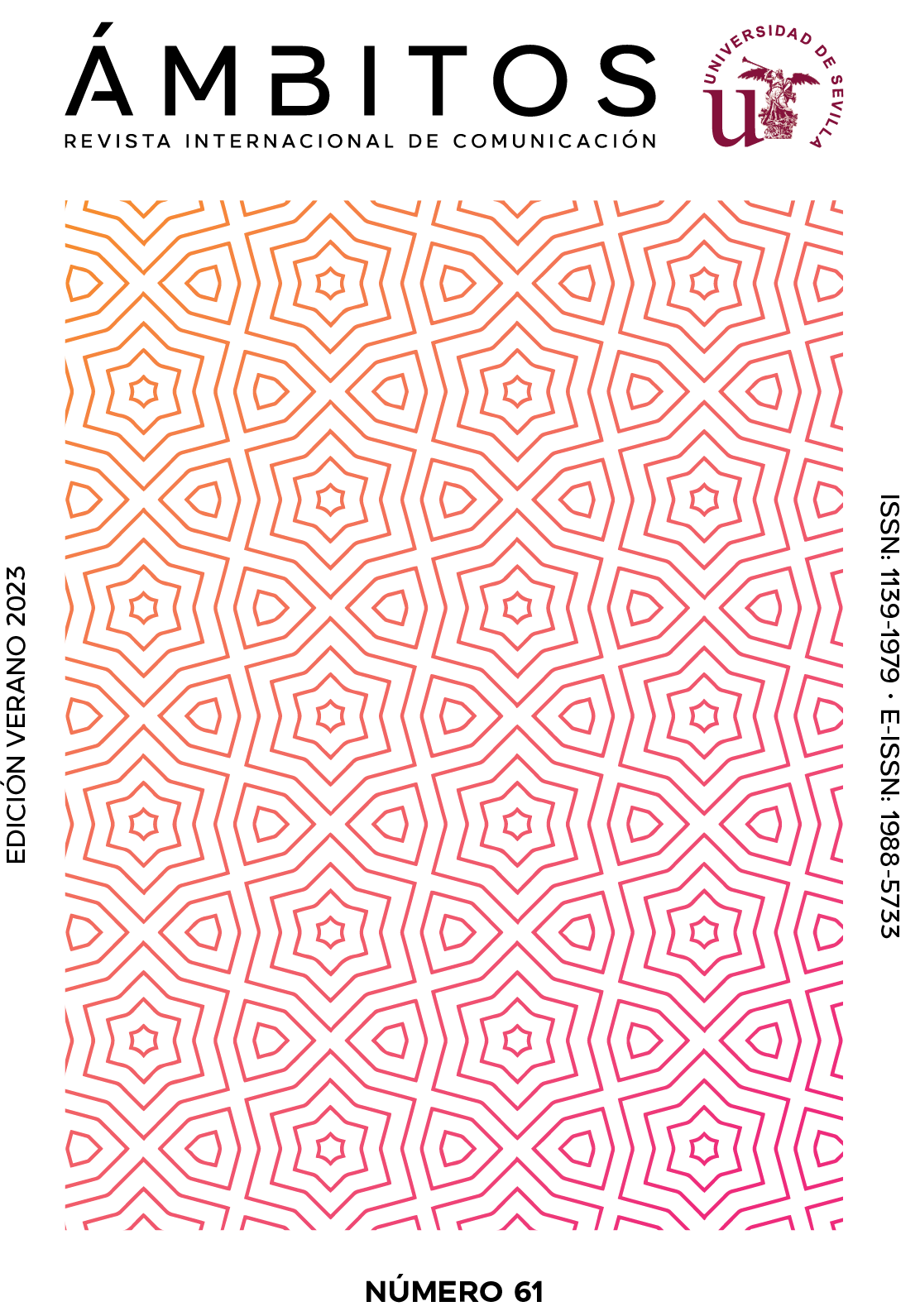Boomers versus Millennials and Gen Z: Digital literacy and social media
DOI:
https://doi.org/10.12795/Ambitos.2023.i61.07Keywords:
digital literacy, digital gap, social media, boomers, digital nativesAbstract
Digital gap which separates the Boomer generation –born between 1946 and 1964– from digital natives –Millennials and Generation Z, born between 1994 and 2012– it’s nowadays, one of the most influential inequities in the current communication process. The lack of digital literacy has triggered the need to develop digital skills in more vulnerable users: the Boomers. This article established a balance between both age groups (n=227) from a perspective of the use of social network with regards to the consumption of current information. On the one hand, we applied a quantitative mythology un pretest format, to students of the Interuniversity Experience Program of University of Salamanca, with a view to future research that deals with the use of social media in Boomers, focused on the consumption of content and current news. On the other hand, we developed a survey to Millennials and Gen Z around their perception of the informative treatment of informative content on television and social networks. This study case provides results that break with social stereotypes that Boomers don’t use social networks and are not educated enough to do so, or that they are not even interest in learning how to use these new tools to consume current information.
Downloads
References
Acevedo, M. T., Ramírez‑Pereira, M., Ramírez‑Correa, P., & Ramírez‑Santana, M. (2022). Percepciones de personas mayores chiles respecto del uso de las redes sociales digitales y su relación con el bienestar subjetivo, en contexto de pandemia SARS CoV‑2. Revista Ibérica de Sistemas e Tecnologias de Informação, (e48), 518–534.
Allievi, M. (22 de julio de 2022). España mejora su nivel de digitalización a raíz de la pandemia. El País. elpais.com/economia/2022‑07‑28/espana‑mejora‑su‑nivel‑de‑digitalizacion‑a‑raiz‑de‑la‑pandemia.html
Brito, L. (17 de septiembre de 2020). Los nuevos desafíos de la alfabetización. [Artículo en línea]. unesco.org/es/articles/los‑nuevos‑desafios‑de‑la‑alfabetizacion
Bunbury Bustillo, E., Pérez Calle, R., & Osuna‑Acebo, S. (2022). Las Competencias Digitales en personas mayores: De amenaza a oportunidad. Vivat Acedemia. Revista de Comunicación, (155), 173–195. https://doi.org/10.15178/va.2022.155.e1383
Cardozo, C., Martin, A. E., & Saldaño, V. (2017). Los adultos mayores y las redes sociales: Analizando experiencias para mejorar la interacción. Informes Científicos Técnicos - UNPA, 9(2), 1–29. https://doi.org/10.22305/ict-unpa.v9i2.244
Cornu, B. (2011). Digital Natives: How do the learn? How to teach them? [Archivo PDF]. unesdoc.unesco.org/ark:/48223/pf0000216681
Fundación Telefónica. (2023). La Sociedad Digital en España 2023. [Archivo PDF] fundaciontelefonica.com/cultura‑digital/sociedad‑de‑la‑informacion/2023/
Gordillo Álvarez, I., & Toledo Aral, S. (2021). Mi abuela es influencer. Redes sociales y envejecientes. En V. Guarinos (Coord.), La Isla Etaria. Tercera edad y medios de comunicación (pp. 85-100). ReaDuck.
Guarinos, V. (2021). La Isla Etaria. Tercera edad y medios de comunicación (1. ª ed.). ReaDuck Divulgación.
Martínez Heredia, N., & Rodríguez‑García, A.-M. (2018). Alfabetización y competencias digitales en personas mayores: El caso del aula permanente de formación abierta de la Universidad de Granada (España). Revista Espacios, 39(10), 37–52.
ONTSI. (2021). Usos y actitudes de consumo de contenidos digitales en España. Ministerio de Asuntos Económicos y Transformación Digital. https://doi.org/10.30923/094‑21‑023‑9_2021
Peral‑Peral, B., Arenas‑Gaitán, J., & Villarejo‑Ramos, A.-F. (2015). De la brecha digital a la brecha psico‑digital: Mayores y redes sociales. Comunicar, 23(45), 57–64. https://doi.org/10.3916/C45‑2015‑06
Peral‑Peral, B., Villarejo‑Ramos, A‑F., & Arenas‑Gaitán, J. (2017). Descifrando la brecha digital de los mayores. Panorama social, (25). 67‑82.
Reina Vanegas, F. C., & Moya Garzón, Y. P. (2022). Alfabetización Digital: una experiencia virtual con personas adultas mayores. Transdigital, 3(5), 1–23. https://doi.org/10.56162/transdigital84
Stoiciu, A. (s. f.). El papel de la gobernanza electrónica en la reducción de la brecha digital. [Artículo en línea]. un.org/es/chronicle/article/el‑papel‑de‑la‑gobernanza‑electronica‑en‑la‑reduccion‑de‑la‑brecha‑digital
Downloads
Published
How to Cite
Issue
Section
License
Copyright (c) 2023 Marta Mori Cureses

This work is licensed under a Creative Commons Attribution-NonCommercial-ShareAlike 4.0 International License.
Ámbitos. Revista Internacional de Comunicación is an open access journal, which means that all content is freely available at no charge to the user or their institution. Users may read, download, copy, distribute, distribute, print, search or link to the full text of articles, or use them for any other lawful purpose, without seeking prior permission from the publisher or author. This definition of open access is in accordance with the Budapest Open Access Initiative (BOAI).

Unless otherwise noted, all content in the electronic edition is distributed under a "Creative Commons Attribution-NonCommercial-ShareAlike 4.0 International License". You can consult the informative version and legal text of the licence here. This should be expressly stated in this way where necessary.
In case of acceptance of the manuscript, the authors cede the rights of the work for its publication to Ámbitos. Revista Internacional de Comunicación under the Attribution-NonCommercial-ShareAlike 4.0 International license contract (CC BY-NC-SA 4.0). The authors retain copyright and third parties are authorised to copy, distribute and make use of the work, provided they comply with the terms and conditions set out in the licence
- Cite the authorship and the original source of publication (journal, publisher and URL of the work).
- Do not use them for commercial purposes.
- If you remix, transform or create from the material, you must release your contributions under the same license as the original.
More information can be found at https://creativecommons.org/licenses/by-nc-sa/4.0/deed.es


















